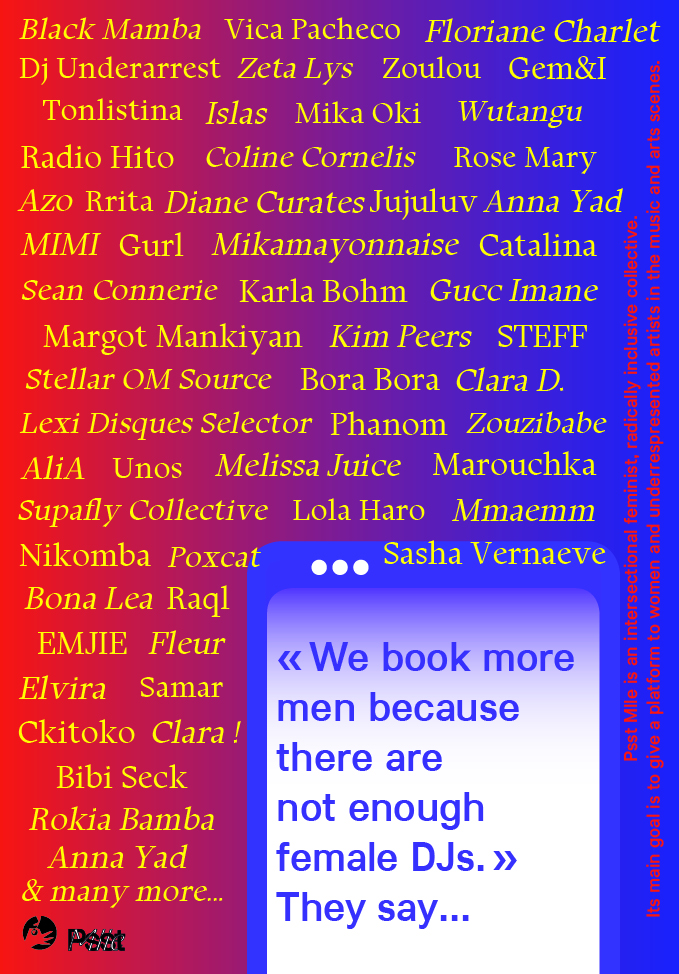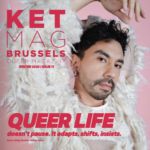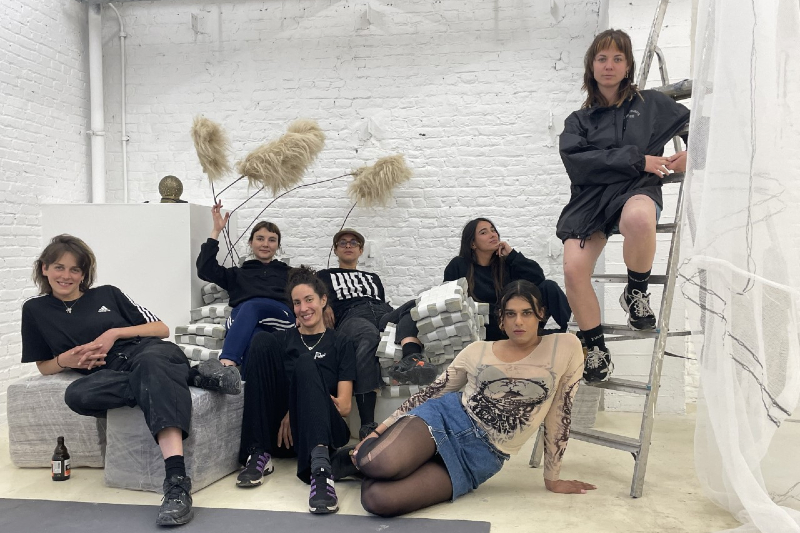“Psst Mlle” is a Brussels-based collective of seven people with the dual aim of creating new spaces in the music and cultural sector for women and gender-minorities to perform as well as promoting these artists on the more mainstream scene.
Can you tell us a bit about the birth of “Psst Mlle” and the different goals behind this project?
Souria:
“Psst Mlle is a feminist platform born in 2018. At the beginning, the goal was to make women more visible in the music scene. I already had a foot in the industry and I wanted to organize events, but it was so obvious to me that men were taking up all the space in most events that I wanted to switch this gender imbalance.
At the start, it was mainly about showcases and DJ sets with an exclusively female line-up. And then over the years, it became a more intersectional platform, which highlights women and gender minorities in a multi-disciplinary way, so it’s not only about music anymore, we also organize talks, workshops, etc…”
Shaine:
“For the 2022 program we have worked on a new format, we always try to organize a workshop or debate about a topic directly related to problems encountered in the nightlife sector. And for the rest of the evening, we invite live artists or DJs.
Recently, we organized “Transmission”, an event based on trans identities, the transmission of trans knowledge and creativity within the community, but it was also open to an audience that is not particularly well informed on that topic. So for this event, we worked exclusively with trans people from A to Z for the visual identity, the photographers, etc… Everything has been managed by trans people and I think these kinds of projects really make sense and feel good.
In fact, we noticed that while there is currently an awakening regarding the presence of women and gender minorities in the nightlife and music sector, most of the time, they remain like token* used by big venues so that they can tell they have 2 or 3 women or queer people performing, just to be able to fit in the new standards. But in the end, we’re not truly included within those scenes yet.”
Today, there are quite a lot of opportunities in the feminist/queer scene for artists to perform and develop. But if they want to evolve elsewhere (out of the feminist/queer scene) it becomes more complicated…
Souria:
“Yes, from the outside, that’s something I’ve noticed too, I often see artists and djs getting booked only by feminist/queer collectives or venues. And precisely, the objective of “Psst Mlle” is to be a platform to make artists visible to this other mainstream circuit.”
Shaine:
“As we were already established in this circuit, we managed to impose ourselves in more mainstream venues. We’ve collaborated with big clubs like C12 for instance. But I think there’s also a certain pride in being able to find new spaces, new venues, and also because it’s cool to be able to put everything together from scratch just with a bunch of girls, and not being obliged to go through these big institutions.”
Souria:
“Yeah, so it’s a true double action: on the one hand, it’s about creating our spaces, building everything from scratch together and having our own communities and then on the other hand it’s also about taking over mainstream places and changing them from the inside. And then by organizing events at C12 for example, it also allows our artists to be visible to the C12’s booking agents and to be rebooked there later on.”
Shaine:
“It helps to push for some changes in their line-up. It’s never enough but it’s slowly starting to change. At least, I think there’s an awakening that’s taking place regarding that issue.”
What kind of obstacles have you encountered when organizing events?
Souria:
“When we launched the project in 2018, there weren’t as many collectives working on this topic as there are today. And it’s super cool that now this issue is being addressed by different people and different collectives because it has much more strength. But at the beginning, I used to receive comments like “why is it only about women, isn’t a bit radical, why not 50/50?”. You always have to justify your vision and it’s very tiring.
Recently Scivias (a platform that drives change for a more inclusive music sector in the Wallonia-Brussels Federation, e.d.) released a report which calculated the number of female and non-binary artists within all Belgian festivals this summer (festivals which are financially supported by the Wallonia-Brussels Federation). And I think there are at about 20% of women and less than 1% of non-binary people in the whole line-up.
And this “tokenism” problem also happens with our collective, sometimes we get invited to certain venues but we don’t know if people really want to support our project or if it’s just to tick a box, get subsidies, and get a good image from the outside.
So yes, there are still a lot of obstacles and being in this position, never being sure if the people who invite us are sincere or not is really exhausting in the long run.”
According to you, what does this lack of inclusion and diversity in the Belgian cultural scene means today? And what are possible solutions to this issue?
Shaine:
“It means that we really have to keep doing what we do and that other people have to do it too. We have to take more and more space.
We also need the institutions to wake up a little bit regarding this issue and truly act! Without this, we won’t be able to achieve gender parity.”
Souria:
“In the end, it’s just a reflection of the rest. The music sector is like any other sector, but now we are finally starting to get reports and statistics. Because, unfortunately, people only understand a problem when they can read numbers and statistics, otherwise it’s not taken seriously. Another problem, however, is that certain data such as racial parity remain illegal to analyze in Belgium for instance. So if we don’t have any data and reports regarding these issues, it makes the problem totally invisible.
But the reports that we have now, we cannot question them. So all the work that Scivias has done is highly important.”
We know now that the imposter syndrome and lack of legitimacy is a feeling that mainly affects women and gender minorities, do you want to address this issue?
Souria:
“As far as I’m concerned, I know that the lack of legitimacy has been my biggest issue since the beginning because I don’t make music, I’m not a music programmer so, when creating this platform I thought “who am I, really, to do this?”. And I think that’s a question that a cisgender man would never ask himself.
And then there is also this “evaporation phenomenon”. Within the people who study music, in fact, there are many more women than men. But afterwards, there are far fewer women starting a professional career and this is called the “evaporation phenomenon”. This is largely because they have so many obstacles afterwards that in the end they rather go into teaching, etc… Also due to the fact that to become professional in a certain sector, you have to feel comfortable in this later, things have to be adapted to you and for now, things aren’t thought by and for women or gender minorities.”
What kind of advice would you give to young women and queer artists who want to get into the artistic/cultural sector today?
Shaine : “Just do it!”
Souria :
“Yes, and actually, with Psst Mlle we did everything backwards. We’ve only been a non- profit organization for the past year, so we’ve been doing everything rather instinctively. We learned on the job. But sometimes, it has also been an obstacle to get access to subsidies and things like that, for instance.
Now, there are a lot of feminist associations and other collectives that are emerging, and they do everything step by step, in the “right order”. And more than that, it’s also important to know what you’re good and not good at and to surround yourself with people who can handle the things you cannot.
But otherwise, you can also do everything in parallel to the system, you don’t have to be in it.”
Shaine:
“I think that’s why we’ve become a multi-disciplinary collective, everyone has their strengths. And that makes us stronger as well, we’re able to raise our voices altogether and it’s very reassuring too. So surrounding yourself with the right people is a key. And for young artists, I would just say to perform as much as you can, to show yourself, to claim your place. Because we, women and queer people, exist and everyone has the right to exist, to produce and to create!”
Don’t miss Psst Mlle’s next event on Friday 29th of October at Atelier 210. Line Up including: DJ Amigo3, Céline Gillain, Lou and Mikamayonnaise. More info can be found on the Facebook event: https://www.facebook.com/events/s/chenille-psst- mlle/5045952675497229/ or website: www.atelier210.be.
Also, don’t forget to follow @psst_mlle on Instagram to stay updated about their future events!
*token/tokenism: something that a person or organization does that seems to support or help a group of people who are treated unfairly in society, such as giving a member of that group an important or public position, but which is not meant to make changes that would help that group of people in a lasting way (https://dictionary.cambridge.org/fr/dictionnaire/anglais/tokenism)

You may also like
-

Adriano Selva: The Soulful Pop Dreamer Who Feels It All
In a world that often rewards detachment, Adriano Selva chooses to stand beautifully exposed. His
-

Splinters of Joy: Lylybeth Merle’s Eco‑Queer Fairy Tale of Transition and Healing
Lylybeth Merle’s new book Échardes (“Splinters”), out in February 2026, is a tender, defiant journey through gender,
-

Music, Books and Brussels: A Conversation with Elliot Ibouzidene
Meeting artist Elliot Ibouzidene to talk about music, literature and his “unwritings” of Athens and Copenhagen, in
-

The New KET Is Out: Queer Brussels Keeps Moving
KET Magazine Issue 11 is out now and available in LGBTQIA+ safe spaces across Brussels,
-

Brussels Art Guide 2026: Mapping a Vibrant Contemporary Scene
Brussels is once again putting its contemporary art scene in the spotlight with the new

